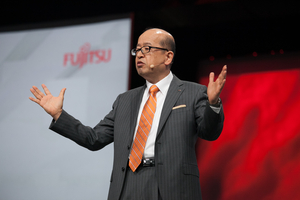![]() Doing battle in the $9 billion Unix server market is not for the timid. Designing a competitive microprocessor is a costly business, and with the Unix market seemingly in permanent decline it’s easy to see why smaller players might drop out.
Doing battle in the $9 billion Unix server market is not for the timid. Designing a competitive microprocessor is a costly business, and with the Unix market seemingly in permanent decline it’s easy to see why smaller players might drop out.
 But Fujitsu says it’s in it for the long haul. Despite its small market share, the company is committed to developing its Sparc64 chip, and it thinks it has a role to play in keeping IBM from becoming too powerful, said Noriyuki Toyoki, Fujitsu corporate senior vice president and the head of its server division.
But Fujitsu says it’s in it for the long haul. Despite its small market share, the company is committed to developing its Sparc64 chip, and it thinks it has a role to play in keeping IBM from becoming too powerful, said Noriyuki Toyoki, Fujitsu corporate senior vice president and the head of its server division.
IBM already has one giant “cash cow” from its dominance in mainframes, he said. If IBM came to dominate Unix in the same way — it already has more than half the market, according to IDC — the industry and its customers would be worse off, according to Toyoki.
“Two cash cows would make IBM much, much stronger. We have to stop it. That would not be good for us and it’s never good for the customer. Customers need alternatives to get the best value,” he said in an interview this week at Oracle OpenWorld.
Fujitsu is a close partner of Oracle. They each develop a version of the Sparc processor, and they jointly design systems and resell each other’s products.
Oracle has been finding a wider role for its own Sparc designs lately, but Toyoki said the future of Fujitsu’s Sparc64 is secure. The Unix market may be shrinking, but it’s still large enough to support multiple RISC architectures, he said.
He brushed off a suggestion that Fujitsu could walk away from Sparc64 and use Oracle’s chips instead. “Frankly, we would not use Oracle’s Sparc chips in our servers,” Toyoki said.
Oracle’s chips perform well, he said — “they’re very efficient, especially for throughput operations” — but Fujitsu’s customers need the RAS (reliability, availability and serviceability) capabilities that bleed into Sparc64 from its mainframe systems.
Sparc64 is also important for Japan. A version is used in the country’s massive K supercomputer, and Fujitsu is “the last Japanese company doing processor development. We’d like to keep doing it,” Toyoki said.
Fujitsu released its new M10 Unix servers earlier this year, with its latest Sparc64 X processor. An upgrade to that chip, Sparc64 X Plus, should be available to customers in the first half of next year, Toyoki said.
It’s a similar design to the Sparc64 X but boosts the clockspeed to a maximum 3.5GHz and adds on-chip accelerators to make tasks like encryption run faster. It also adds a Fujitsu technology called Coherent Memory Interconnect, or CMI, which Toyoki said will drastically reduce latency times for scale-out clusters.
CMI also helps speed up Oracle’s RAC (Real Application Clusters) technology, Toyoki said, and he hopes Oracle will use CMI in its own systems. “We’re now discussing that with the Oracle engineering group,” he said. CMI helps relieve a bottleneck that occurs in scale-out systems even when using high-speed Infiniband interconnects, he said.
Toyoki is also looking ahead to Sparc64 XI, which will likely have more cores, faster clock speeds, and move more software tasks into hardware to speed performance, he said.
Sparc64 XI may become Fujitsu’s first server processor manufactured on a 20 nanometer process, Toyoki said. The Sparc64 X and X Plus are 28-nanometer parts, and the newer process would allow smaller, faster transistors.
Fujitsu is usually listed in the top five Unix vendors, but it trails far behind IBM, Oracle and Hewlett-Packard. Toyoki hopes the work Fujitsu is doing to make Oracle software run best on Fujitsu servers will expand his market share. “I believe it will be a big differentiation,” he said.
Fujitsu is also exploring three-dimensional transistors, which Intel introduced last year with its Tri-Gate products. The 3D designs help combat electrical leakage at very small scales and extend the life of the standard CMOS semiconductor manufacturing technology.
Fujitsu will likely introduce its 3D transistors at its next process shrink after 20 nanometers, Toyoki said.
Like Oracle, Fujitsu is positioning its machines for big data workloads, which can be processed more quickly on servers with large system memories. This month, Fujitsu will start to offer denser memory chips that will double the maximum footprint on its M10 servers to a massive 64TB.
Asked when the first system will appear with a petabyte of memory, Toyoki said it could happen in three generations of Sparc64. That would be enough memory to analyze some very big data.









